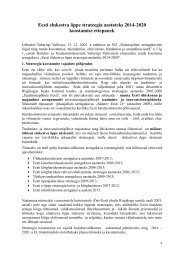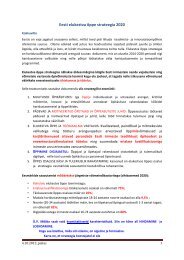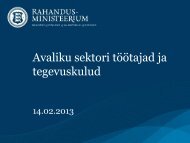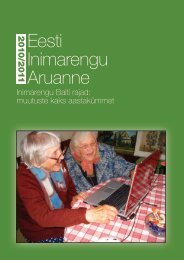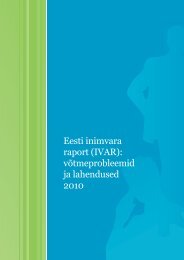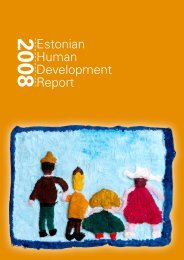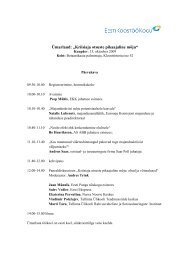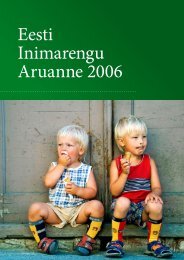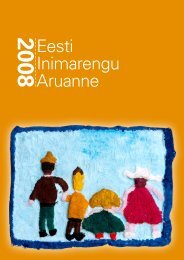DEVELOPMENT
The pdf-version - Eesti Koostöö Kogu
The pdf-version - Eesti Koostöö Kogu
You also want an ePaper? Increase the reach of your titles
YUMPU automatically turns print PDFs into web optimized ePapers that Google loves.
1.3<br />
Education<br />
Anu Toots, Triin Lauri<br />
Today, expectations have increased considerably for the<br />
contribution that education can make to the development<br />
of society. We often hear people speak about education<br />
as a cure for absolutely all our worries. In this century,<br />
the subject of education has appeared on the agendas of<br />
several international organisations that previously did<br />
not deal with education (OECD, EU, WB, and WTO).<br />
To date, education as a factor of cultural integration has<br />
been considered to be part of the domestic sphere, but the<br />
ascendancy of international organisations in educational<br />
governance 1 alludes to the globalisation of education and<br />
education policy.<br />
Generally, we can talk about two tasks that are<br />
assigned to the modern governance of education. Firstly,<br />
the economic role, according to which good education<br />
is the key to a country’s economic competitiveness and<br />
sustainability. This point of view explains why, along<br />
with the UN, international organisations that are focused<br />
on the economy, such as the Organisation for Economic<br />
Co-operation and Development (OECD), the World Bank<br />
(WB) and the World Economic Forum (WEF) have<br />
started to show interest in the measuring and (ranking)<br />
education.<br />
Education’s second, cultural and political task is<br />
to increase social cohesion. This perspective has also<br />
become markedly more multifaceted than the initial<br />
approach of the UN, which focused on human rights.<br />
Education is, of course, part of an individual’s capital and<br />
this approach is amply stressed on the neoliberal worldview,<br />
but in addition to this, education is an efficient<br />
tool for promoting the understanding and a meeting of<br />
minds between people. According to several studies, educated<br />
people are more tolerant, are greater supporters of<br />
democracy (Mc Mahon 2004), behave more constructively<br />
in regard to their health (Grossmann 2000), are happier<br />
(Putnam, Helliwell 1999) and cope better on the labour<br />
market. The economic and social functions of education<br />
are intertwined, because modern economies and democracies<br />
presuppose the existence of socially sensitive<br />
people with open mindsets, who are able to quickly adapt<br />
to new working collectives and cultures, and to intelligently<br />
and actively participate in public life. The attempt<br />
to reconcile the rational and social functions of education<br />
are characteristic primarily of the European Union, the<br />
educational objectives of which (ET2020) are aimed at<br />
smart economic growth, and do so through education’s<br />
social indicators (e.g. by reducing the percentage of early<br />
leaving and children with meagre basic skills).<br />
Along with knowledge-based and global economies,<br />
population ageing also an important impact on educational<br />
development, and has caused widespread tensions<br />
related to the financing of education. The ageing of populations<br />
has introduced the philosophy of lifelong learning<br />
into education, according to which a person must<br />
learn from the cradle to the grave. This, in turn, has<br />
been accompanied by the measurement of educational<br />
enrolment in the context of every sphere of life. Thus,<br />
the European Union and the World Economic Forum<br />
measure the rate of adult educational enrolment, and in<br />
2011, the OECD conducted the first comparative PIAAC<br />
survey, known as the “adult PISA”, in order to measure<br />
the adults’ knowledge and skills related to coping in the<br />
workplace. 2 The EU and OECD measure the rate of educational<br />
enrolment among pre-schoolers (3- to 5-yearolds);<br />
and the IEA is planning a survey to measure the<br />
knowledge and skills of children in the same age group.<br />
The emphasis of the importance of early childhood education<br />
in EU and OECD materials is motivated by the<br />
conviction that, at this stage of education, the efficiency<br />
of outcome and equity of the investments complement<br />
each other. The further in time that the investments in<br />
education are postponed, the greater the risk that the<br />
aspiration for equity will come at the expense of efficiency.<br />
(Cunha et al. 2005).<br />
Along with early childhood education and lifelong<br />
learning, an important change is the expansion of higher<br />
education. Once the privilege of the few, today higher<br />
education is an opportunity for the majority, and the<br />
European Union has set a goal of having a society in<br />
which 40% of the population has a higher education. The<br />
latter has, in turn, caused tensions related to the financing<br />
of education and accelerated the debate about the nature<br />
of higher education (is it a public or private commodity)<br />
and the cross-border providers of education (export of<br />
educational services).<br />
1.3.1<br />
International measures of education<br />
Education is measured by many international composite<br />
indices and rankings. This confirms the importance<br />
of educational indicators in the measurement of a society’s<br />
developmental levels and trends. Generally, we<br />
can speak about composite indices, one sub-index of<br />
which is some measure of education or the indicators<br />
that come directly from indices/rankings that measure<br />
1 “Governance” is a term that has recently gained popularity in academic literature and the notions of its use and meanings are quite blurred.<br />
Here governance alludes to a new type of governing, in which the state has a steering role rather than an implementative role, and in which<br />
partners from the private and non-profit sector are involved from the local to the global level.<br />
2 Program for the International Assessment of Adult Competencies, in Estonia known under the name “Tean ja oskan”.<br />
30<br />
Estonian Human Development Report 2012/2013



